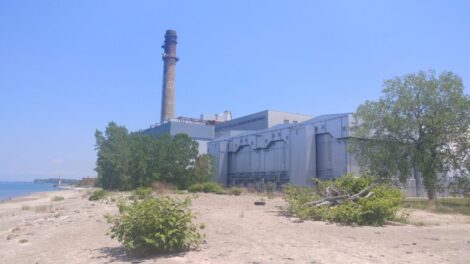Climate change bill could increase gas tax 55 cents a gallon

AP file photo
Legislation backed by 23 members of the state Senate could result in a 26% increase in natural gas heating costs and a 55 cent-a-gallon increase in gasoline taxes.
The Climate And Community Investment Act (S.4264A) was introduced in early February by state Sen. Kevin Parker, D-Brooklyn, and assigned to the Senate’s Environmental Conservation Committee on March 22. The bill would impose a carbon tax of $55 per ton of fossil fuel emissions from all sources, including schools, factories and on the use of gasoline.
More details about the proposal came out during a Senate public hearing held Tuesday, including a Business Council of New York State analysis showing the impact on the natural gas industry and gasoline.
Kenneth Pokalsky, vice president of the Business Council of New York State, tied his group’s analysis to a $15 billion estimate of taxes and fees raised by the Climate and Community Investment Act. The council estimates natural gas would account for $4.2 billion of the $15 billion in fees, with natural gas costs projected to increase 26% based on historical natural gas use trends. Gasoline taxes would have to increase 55 cents a gallon to meet residential transportation segment’s goals in the legislation.
Sen. James Gaughran, D-Syosset, was among the legislators who spoke during Tuesday’s public hearing and blanched at the projected increase in gasoline taxes. Gaughran’s district is dependent on automobiles, and Gaughran noted many of his constituents can’t afford either an electric vehicle or such a hefty increase in gasoline taxes.
“I’d like to see a provision that makes it really clear, particularly for people who are driving automobiles and they have to drive so many miles – there are people who will drive 20,000 miles a year just for commuting purposes only in my district. Let’s come up with a salary,” Gaughran said. “Let’s figure out what the maximum salary is to qualify for it and then give these folks an exemption so that they’re not unduly subsidizing this program. We can tailor some sort of a rebate program specifically for people like that as it relates to automobile users who have no alternatives at this time.”
Environmental advocates pointed Gaughran and other legislators to debate provisions in the Climate and Community Investment Act that they say protect low- to moderate-income state residents. Eligible taxpayers would automatically be enrolled in the Household and Small Business Energy Rebate Program, though the legislation states rebates would only be paid if there is enough money in the fund. The rebate would apply to 60% of state households. Benefits could include transit vouchers for public mass transit, utility assistance or a weatherization grant or “other forms that comply with this subdivision.” Lawmakers asked pointed questions about how the gasoline tax rebate would be structured, but environmental advocates had no firm answers for them other than taxpayers would be automatically enrolled in the rebate program if they qualify and that people could save money in the long run with more efficient vehicles and heating systems in their homes.
“I’ve heard the $15 billion number thrown out a number of times. That’s a big number. In our analysis the tax on natural gas alone would be $4.2 billion,” Pokalsky said. “That would be a 26% increase in the cost. The cost of gasoline would be $2.3 billion, about 55 cents per gallon. For those who aren’t getting rebates those are significant costs that would have to be absorbed.”
Many environmental groups support the creation of a carbon tax to spur businesses and individuals to change their behavior and purchasing choices. Higher gas prices are designed to spur more sales of electric vehicles and use of mass transit. Ryan Madden, sustainability organizer of the Long Island Progressive Coalition Citizen Action on Long Island, testified that lawmakers shouldn’t assume fossil fuel companies will pass the gasoline tax proposed in the legislation on to consumers.
“We’re assuming these costs are being passed on as a natural law when they are going to be making decisions for that on their own bottom line without us first asking how are they going to prioritize how much their CEO and top management gets paid,” Madden said. “So it feels like a really important reframe that the burden is not on all of us to ask this. What are these polluters — Exxon Mobil’s CEO got a raise up to $23 million alone in 2019. I don’t think that’s necessary. I feel like that’s an important reframe.”




